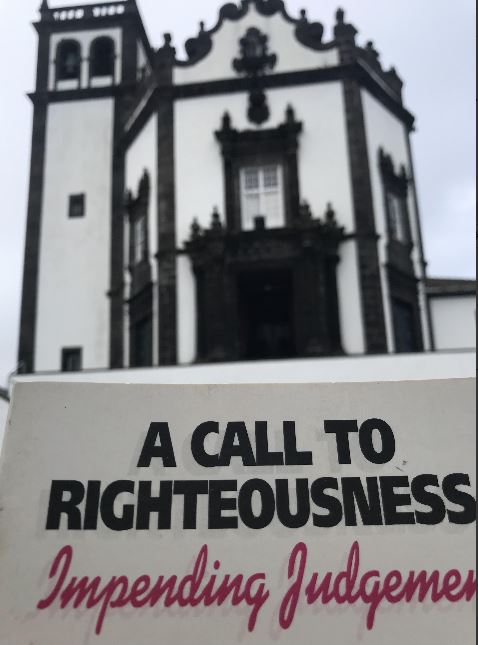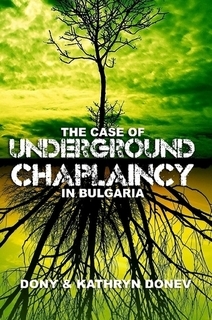A Call to Righteousness over Portugal

Our 1999 Thanksgiving Letter 25 Years Later
Greetings in the wonderful name of our Lord and Savior Jesus Christ.

During this Thanksgiving season my gratitude is extended to the Almighty and Eternal God for giving me the opportunity to minister His Word and encourage His people. I also want to thank you for your tremendous support and caring guidance. My heart joins with yours, in a prayer for blessing, success and prosperity of your family and church in the upcoming Millennium. We all need to use the little time that remains as an opportunity for spiritual renewal and personal preparation for the 21st Century.
After finishing this semester at the Theological Seminary, I will have a few weeks free during the last part of December. During this time, I would love to join with you in the effort to win the lost for the Kingdom of God. If I can be of any help in this quest for truth and spirituality, please do not hesitate to let me know.
Sincerely,
Rev. Dony K. Donev
Creation and the Cross
BY HENRY M. MORRIS, PH.D. | THURSDAY, APRIL 01, 1976
The two greatest events in all history are the creation of the world and the redemption of the world. Each of these events involved a great divine Week of work and a Day of rest. Creation Week accomplished the work of man’s formation; the week that is called Holy Week or Passion Week (perhaps a better term would be Redemption Week) accomplished the work of man’s salvation.
Creation Week, which culminated in a perfect world (Genesis 1:31), was followed by man’s fall and God’s Curse on the world (Genesis 3:17). Passion Week, which culminated in the death and burial of the maker of that perfect world, is followed by man’s restoration and the ultimate removal of God’s Curse from the world (Revelation 22:3). A Tree (Genesis 3:6) was the vehicle of man’s temptation and sin; another Tree (I Peter 2:24) was the vehicle of man’s forgiveness and deliverance.
The Two Weeks
It is fascinating to compare the events of the seven days of Creation Week and Redemption Week, respectively. The chronology of the events of Redemption Week has been the subject of much disagreement among scholars, and it is not possible to be certain on a number of the details. The discussion below is not meant to be dogmatic, but only to offer a possible additional dimension to their understanding and harmony. The traditional view that Friday was the day of the crucifixion is further strengthened by the correlations suggested in this study.
(1) First Day. The first day of creation involved the very creation of the universe itself (Genesis 1:1). An entire cosmos responded to the creative fiat of the Maker of heaven and earth. Initially this Space-Mass-Time (i.e., heaven, earth, beginning) continuum was created in the form of basic elements only, with no structure and no occupant (Genesis 1:2), a static suspension in a pervasive, watery matrix (II Peter 3:5). When God’s Spirit began to move, however, the gravitational and electromagnetic force systems for the cosmos were energized. The waters and their suspensions coalesced into a great spherical planet and, at the center of the electromagnetic spectrum of forces, visible light was generated (Genesis 1:3).
In a beautiful analogy, on the first day of Passion Week, the Creator King of the universe entered His chosen capital city (Zechariah 9:9,10; Matthew 21:1-9) to begin His work of redemption, as He had long ago entered His universe to begin His work of creation. Even the very elements He had created (Luke 19:39, 40) would have acknowledged His authority, though the human leaders of His people would not.
(2) Second Day. Having created and activated the earth, God next provided for it a marvelous atmosphere and hydrosphere in which, later, would live the birds and fishes. No other planet, of course, is equipped with air and water in such abundance, and this is strong evidence that the earth was uniquely planned for man and animal life. The hydrosphere was further divided into waters below and waters above “the firmament.” The waters above the firmament (the Hebrew word for firmament means, literally “stretched-out space”) probably comprised a vast blanket of transparent water vapor, maintaining a perfect climate worldwide, with ideal conditions for longevity.
Paralleling the primeval provision of life-sustaining air and water, on the second day of Redemption Week, He entered again into the city (having spent the night in Bethany) and taught in the temple. As He approached the city, He cursed the barren fig tree (Mark 11:12-14) and then, in the temple, overthrew the tables of the money changers (Mark 11:15-19). This seems to have been the second time in two days that He had turned out the money changers (the parallel accounts in Matthew and Luke indicate that He also did this on the first day). Both actions¾the cursing of the fig tree and the cleansing of the temple¾symbolize the purging of that which is barren or corrupt in the Creator’s kingdom. He had created a world prepared for life (air for the breath of life and water as the matrix of life), but mankind, even the very teachers of His chosen people, had made it unfruitful and impure. As physical life must first have a world of pure air and water, so the preparations for a world of true spiritual life require the purifying breath of the Spirit and the cleansing water of the Word, preparing for the true fruit of the Spirit and the true temple of God’s presence, in the age to come.
(3) Third Day. The next day, the sight of the withered fig tree led to an instructive lesson on faith in God, the Lord Jesus assuring the disciples that real faith could move mountains into the sea (Mark 11:20-24). In parallel, on the third day of creation, God had literally called mountains up out of the sea (Genesis 1:9,10).
It was also on this day that the Lord had the most abrasive of all His confrontations with the Pharisees and Sadducees. He spoke many things against them and they were actively conspiring to destroy Him. It is appropriate that His challenges to them on this day began with two parables dealing with a vineyard (Matthew 21:28-32 and Matthew 21:33-43; see also Mark 12:1-11 and Luke 20:9-18), in which He reminded them that they had been called to be in charge of God’s vineyard on the earth, and had failed. Like the fig tree, there was no fruit for God from their service, and therefore, they would soon be removed from their stewardship.
Likewise, the entire earth was on the third day of Creation Week prepared as a beautiful garden, with an abundance of fruit to nourish every living creature (Genesis 1:11,12) and it had been placed in man’s care (Genesis 1:28-30; 2:15). But mankind in general, and the chosen people in particular, had failed in their mission. Before the earth could be redeemed and made a beautiful garden again (Revelation 22:2), it must be purged and the faithless keepers of the vineyard replaced.
This third day of Passion Week was climaxed with the great Sermon on the Mount of Olives in which the Lord promised His disciples that, though Jerusalem must first be destroyed, He would come again, in power and great glory, to establish His kingdom in a new Jerusalem (Matthew 24 and 25; Mark 13; Luke 21). It was appropriate that He should then spend the night following that third day, with the handful of disciples who were still faithful to Him, on the Mount of Olives (Luke 21:37), for the Mount would call to memory that far-off third day of Creation Week when He had drawn all the mountains out of the sea. Also, the Garden of Gethsemane on its slopes, with its little grove of vines and fruit trees, would bring to mind the beautiful Garden of Eden and the verdant world He had planted everywhere on the dry land on that same third day. Because of what He was now about to accomplish at Jerusalem (Luke 9:31), the ground would one day be cleansed of its Curse, and all would be made new again (Revelation 21:5).
(4) Fourth Day. On the fourth day of Creation Week, the Lord Jesus had formed the sun and the moon and all the stars of heaven. There had been “light” on the first three days, but now there were actual lights! Not only would the earth and its verdure be a source of beauty and sustenance to man, but even the very heavens would bring joy and inspiration to him. Furthermore, they would guide his way and keep his time.
But instead of the stars of heaven turning man’s thoughts and affections toward His Creator, they had been corrupted and identified with a host of false gods and goddesses. Furthermore, instead of creating a sense of awe and reverence for the majesty of the One who could fill all heavens, they had bolstered man’s belief that the earth is insignificant and meaningless in such a vast, evolving cosmos. Perhaps thoughts such as these troubled the mind of the Lord that night as He lay on the mountain gazing at the lights He had long ago made for the darkness.
When morning came, He returned to Jerusalem, where many were waiting to hear Him. He taught in the temple (Luke 21:37, 38), but the synoptic gospels do not record His teachings. This lack, however is possibly supplied in the apparently parenthetical record of His temple teachings as given only in the fourth gospel (John 12:20-50) because there the Lord twice compared Himself to the Light He had made: “I am come a light into the world, that whosoever believeth in me should not abide in darkness.” “Yet a little while is the light with you. Walk while ye have the light, lest darkness come upon you; for he that walketh in darkness knoweth not whither he goeth” (John 12:46, 35). He who was the true Light must become darkness, in order that, in the new world, there would never be night again (Revelation 22:5).
(5) Fifth Day. There is little information given in the gospels about the fifth day of Redemption Week. When there were yet “two days until the Passover” (Mark 14:1), right after the bitter confrontation with the scribes and chief priests on the Third Day, the latter began actively seeking a means to trap and execute Jesus, though they feared to do it on the day on which the Passover Feast was to be observed (Mark 14:2). It was either on the Fourth Day or possibly on this Fifth Day, which was the feast day, that Judas went to them with his offer to betray Jesus. He had apparently been seriously thinking about this action ever since the night when the Lord had rebuked him for his cupidity. This had been in the home in Bethany, on the night of the Sabbath, just before the day when Christ entered Jerusalem riding on the ass (John 12:1-8). This seems to have been the same supper described in Matthew 26:6-13 and Mark 14:3-9, even though in these it is inserted parenthetically after the sermon on the Mount of Olives, probably in order to stress the direct causal relation of this supper to Judas’ decision to betray his Master (Matthew 26:14-16; Mark 14:10-11).
On this day of the Passover, the Lord Jesus instructed two of His disciples to make preparations for their own observance of the feast that night (Mark 14:12-17). So far as the record goes; this is all that we know of His words during that day, though there is no doubt that He was teaching in the temple on this day as well (Luke 21:37, 38). Perhaps this strange silence in the record for this Fifth Day is for the purpose of emphasizing the greater importance of these preparations for the Passover. The fact that John indicates the preparation day to have been the following day (John 19:14) is probably best understood in terms of the fact that, at that time, the Galileans are known to have observed the Passover on one day and the Judeans on the following day.
Multitudes of sacrificial lambs and other animals had been slain and their blood spilled through the centuries, but this would be the last such acceptable sacrifice. On the morrow, the Lamb of God would take away the sins of the world (John 1:29). He would offer one sacrifice for sins forever (Hebrews 10:12). With the blood of His cross, He would become the great Peace Maker, reconciling all things unto the Maker of those things (Colossians 1:16, 20).
As the Lord thought about the shedding of the blood of that last Passover lamb on that Fifth Day of Holy Week, He must also have thought of the Fifth Day of Creation Week, when He had first created animal life. “God created every living creature (Hebrew nephesh) that moveth” (Genesis 1:21). This had been His second great act of creation, when He created the entity of conscious animal life (the first had been the creation of the physical elements, recorded in Genesis 1:1). In these living animals, the “life” of the flesh was in their blood, and it was the blood which would later be accepted as an atonement for sin (Leviticus 17:11). Note that the words “creature,” “soul,” and “life” all are translations of the same Hebrew word nephesh. Surely the shedding of the innocent blood of the lamb that day would recall the far-off day when the “life” in that blood had been created. And because He, the Lamb of God, was about to become our Passover (I Corinthians 5:7), death itself would soon be swallowed up in victory and life (1 Corinthians 15:54).
(6) Sixth Day. On the Sixth Day, man had been created in the image and likeness of God, the very climax and goal of God’s great work of creation (Genesis 1:26, 27). But on this Sixth Day, God, made in the likeness of man, finished the even greater work of redemption.
Under the great Curse, the whole creation had long been groaning and travailing in pain (Romans 8:22). But now the Creator, Himself, had been made the Curse (Galatians 3:13; Isaiah 52:14), and it seemed as though the Creation also must die. Though He had made heaven and earth on the First Day, now He had been lifted up from the earth (John 3:14) and the heavens were silent (Matthew 27:46). Though He had made the waters on the Second Day, He who was the very Water of Life (John 4:14), was dying of thirst (John 19:28).
On the Third Day He had made the dry land, but now the “earth did quake and the rocks rent” (Matthew 27:51) because the Rock of salvation had been smitten (Exodus 17:6). He had also covered the earth with trees and vines on that third day, but now the True Vine(John 15:1) had been plucked up and the Green Tree (Luke 23:31) cut down. He had made the sun on the Fourth Day, but now the sun was darkened (Luke 23:45) and the Light of the World (John 8:12) was burning out. On the Fifth Day He had created life, and He Himself was Life (John 11:25; 14:6), but now the life of His flesh, the precious blood, was being poured out on the ground beneath the cross, and He had been brought “into the dust of death” (Psalm 22:15). On the Sixth Day He had created man and given him life, but now man had despised the love of God and lifted up the Son of Man to death.
(7) Seventh Day. But that is not the end of the story, and all was proceeding according to “the determinate counsel and foreknowledge of God” (Acts 2:23). “On the seventh day God ended His work which He had made” (Genesis 1:21). Furthermore, “everything that He had made was very good” (Genesis 1:31). God’s majestic work of Creation was complete and perfect in every detail.
And so is His work of salvation! This is especially emphasized in John’s account: “After this, Jesus knowing that all things were now accomplished, that the Scripture might be fulfilled, saith, “I thirst… When Jesus therefore had received the vinegar, He said, it is finished; and He bowed His head, and gave up the ghost” (John 19:28, 30) (the emphasized words are all the same word in the Greek original). Jesus had finished all the things He had to do, and then He finished the last of the prophetic scriptures that must be carried out. Then, and only then, was the work of redemption completed and the price of reconciliation fully paid, so that He could finally shout (Matthew 27:50) the great victory cry, “It is finished.”
The record of Creation stresses repeatedly that the entire work of the creation and making of all things had been finished (Genesis 2:1-3). In like manner does John’s record stress repeatedly the finished work of Christ on the cross.
Furthermore, as the finished creation was “very good,” so is our finished salvation. The salvation which Christ thus provided on the cross is “so great” (Hebrews 2:3) and “eternal” (Hebrews 5:9), and the hope thereof is “good” (II Thessalonians 2:13).
Then, finally, having finished the work of redemption, Christ rested on the seventh day, His body sleeping in death in Joseph’s tomb. He had died quickly, and the preparations for burial had been hurried (Luke 23:54-56), so that He could be buried before the Sabbath. As He had rested after finishing His work of Creation, so now He rested once again.
On the third day (that is the First Day of the new week), He would rise again, as He had said (Matthew 16:21, et al). His body had rested in the tomb all the Sabbath Day, plus part of the previous and following days, according to Hebrew idiomatic usage, “three days and three nights” (Matthew 12:40)¾but death could hold Him no longer. He arose from the dead, and is now alive forevermore (Revelation 1:8).
TRUMP is the 47th
November 15, 2024 by Cup&Cross
Filed under Featured, News, Publication

35 Years Since the Fall of the Berlin Wall
The Berlin Wall in our Minds
Europe is celebrating the 35th anniversary from the Fall of the Berlin Wall – an event that has changed forever the course of modern history. For us it was more than a miracle to see how people gathered together free from fear of persecution to celebrate the Resurrected Christ. It almost seemed like they celebrated their own resurrection, the resurrection of the Bulgarian Church of God, from the years of trials and persecutions under the Communist Regime.
But 35 years after its fall, the Berlin Wall still stands tall in the eastern European mindset. This is especially true for the country of Bulgaria and the evangelical churches operating on its territory. The Bulgarian Pentecostal Movement has experienced more structural and leadership difficulties in the past decade, than they have in their almost centennial existence. The post-totalitarian model of church leadership had a destructive aftereffect on the two major wings of the movement, as the historically more independent Bulgarian Church of God has experienced a series of biannual splits in the past six years, while the Assemblies of God represented in Bulgaria by the Pentecostal Union Churches is undergoing leadership changes which will leave their mark on its identity as a movement.
The context of ministry is becoming even more accelerant in light of the first 100 days of the new center-rightist Bulgarian government, proposing even newer changes in the religious laws of the country which will limit the government registration only to churches who can prove a membership over 5,000 people. This limit may become unreachable as many church members are among the 4 million Bulgarians who in the past decade have left the country in search of work and a better life and now reside in Western Europe or the United States. If such legal change indeed occurs, more red tape is coming in Bulgaria against the preaching of the Gospel, religious education and faith as a whole, which will be put under the authority of a government religious council upon the recommendation of the European Union and after the Eastern Orthodox monopolistic paradigm of the Russian Federation.
The three local church models which comprise the Bulgarian Evangelical Movement are not ready to face this new brutal attack against their religious freedom. The small village churches, led mostly by mission representatives sent by larger church communities, often waver between different denominations, which results to doubling and some times tripling their registrations thus becoming an easy first target to any new government restrictions.
Over half of the midsize city churches (70-95 members) have emerged after a church split, which has remained as an unfortunate part of their identity, which reoccurs in their life and ministry. This process is valid in both Bulgarian and other ethnic communities in the country with an emphasis on the Roma Gipsy churches. The result is more small and weakened churches or even home group communities who never undergo normal church growth, thus remaining distant from the outside religious life and often closing themselves to a strangely sectarian existence.
Finally, a few nondenominational churches have retained their own evangelical identity leaving the mainstream denominations and continue to build relationships with sponsoring religious organizations outside of Bulgaria. Having gained financial and leadership independency, they have been successful to complete their building projects and enjoy temporary autonomy. Thus, a dozen of large Bulgarian congregations with several hundred in attendance, located in the capital Sofia, the Danube River city of Rousse, the Black Sea ports of Bourgas and Varna and the industrial towns of Plovdiv and Stara Zagora, have undertaken building projects perhaps as more of a business opportunity. But the aftereffect of their bi-decadal efforts, have shifted their focus from ministry toward building ministry centers and have left their financial resources drained and their supporters demotivated in the midst of global economic crises. And so the Wall remains in the mindset and the crises within the identity of the Bulgarian evangelical believer.
Some three and a half decades ago at the Berlin Wall, President Reagan turned to Soviet Prime Minister Michael Gorbachev with the words: “Tear this wall down …” But Gorbachev cannot help tear down the Wall in our minds. This part of the liberation of the human spirit, mind and soul still remains in the perimeter of God’s grace for human salvation. The answer for global crises lies in the spiritual laws set by God in the Bible that still stands strong as the standard for living. And most important of all: the focus of the Bulgarian Church must remain not in building projects or church split competitions, but in the Spirit given mission of salvation of eternal human souls. Pray for BULGARIA.
200 DAYS of REVIVAL

Celebrating 16 Years of Chaplaincy on the High Seas
 We began our literal journey of ministry on the high seas in 2009. After exploring the opportunity for several years’ prior and submitting applications to various chaplaincy organizations which dealt with such ministry, the doors finally opened for Cup and Cross.
We began our literal journey of ministry on the high seas in 2009. After exploring the opportunity for several years’ prior and submitting applications to various chaplaincy organizations which dealt with such ministry, the doors finally opened for Cup and Cross.
This search for a ministerial identity and its proper application in the real world coincided with the start of the Master’s in Chaplaincy Ministry Program which we designed for the Bulgarian Evangelical Theological Institute in Sofia around 2008-2009. The long standing relationships with professors, active military chaplains from various fields and countries, and the wisdom of several Generals in the field helped us calibrate our ministry focus with what is needed by real people in the real world.
The new fad “to be real” is not enough in a realistic ministry setting. When 25ft. high storm waves beat the aft and the ship is thrown towards the dark wall of ocean waters ahead, one cannot help but “to be real” and depend on a very real and skilled crew. A captain alone cannot run the boat through a storm even if all systems are reported working. It is the crew deep down in the engine room and making its way on the slippery deck that makes it all happen.
The Crew. Some of them have not seen their families for months or even a year at times. They struggle with the same fears and anxieties as the rest of us. Except, while the rest of us can hold on to something for dear life, the crew is obligated by duty to continue to serve and move the boat ahead. The little chapel on the top deck becomes a passage to a lagoon past the riffs of stormy life where stories are shared, prayers are lifted up together and human lives are reclaimed anew for Heaven.
We have found these nontraditional paths of travel and ministry yielding the most unique encounters and connections for Kingdom growth. Our family is thankful for these 10 years and looking forward to even more means of ministry outside of the four church walls. If you would like for us to come to your church as share our journey feel free to reach out to us.
Also important [click to read]:
- U.S. Department of State recognizes our chaplaincy efforts in Bulgaria
- Bulgarian Chaplaincy Association: Integration Proposal with Local NATO Programs
- Bulgarian Chaplaincy Association: Vision and Resolution
- Chronology of our role and involvement in developing Church of God chaplaincy in Bulgaria since 2001
- Master’s of Chaplaincy Ministry Program in Bulgaria Reflections
- The Past Decade of Chaplaincy in Bulgaria (2006-2016)
- Related Publications and Presentations by Cup & Cross Ministries International
More Publications on the Topic and History of Events:
- Chaplaincy Conference and Master’s of Chaplaincy
- Chaplaincy Course in Yambol, BULGARIA
- Bulgarian Chaplaincy Association Annual Meeting
- Family Seminar for Military Men and Women
- Cup & Cross Ministries in Church of God Publications
- The Case of a NATO Chaplaincy Model within the Bulgarian Army
- 10 Years of Military Ministry in Bulgaria
- National Chaplaincy Conference
- Bulgarian Chaplaincy Association Gains Legal Status
- Chaplain Dees Visits Bulgaria
- Chaplaincy Course at the Bulgarian Evangelical Theological Institute
- Bulgarian Chaplaincy Association
- Meeting the NATO Chaplain
- National Chaplaincy Meeting
- Chaplaincy Developments in Bulgaria
- U.S. Bases in Bulgaria
- National Chaplaincy Meeting
- Chaplaincy in Bulgaria
- HEALTHCARE CHAPLAINCY IN BULGARIA
- Chaplaincy in Bulgaria
- Mission Bulgaria
Bulgarian Exit Polls Raise Fears Of Political Stalemate
SOFIA – In what appears to be the continuation of a long-standing political deadlock, exit polls gave former Prime Minister Boyko Borisov’s center-right GERB party the most votes in Bulgaria’s parliamentary elections but without enough support to form a government by itself.
The influential Alpha Research/BNT exit poll gave GERB 26.4 percent of the vote, followed by the reformist PP (We Continue The Change) at 14.9 percent and the far-right, pro-Russia Revival Party at 12.9 percent, amid low turnout. An exit poll conducted for bTV by Market Links had similar results, albeit with a slightly higher figure for GERB. Other parties appeared to score enough to reach the 4 percent minimum requirement to gain seats in parliament, with two other groupings near that level.
Borisov’s pro-Western GERB party is not expected to win enough seats for a parliamentary majority and will need to form a coalition. GERB announced that Borisov would be their candidate for prime minister if it secures at least 80 out of 240 seats in parliament. PP (We Continue The Change) has said it would not support Borisov for the position and have demanded an independent prime minister with strong anti-corruption credentials.
Bulgarian Elections Explained
October 2024 Bulgarian Parliamentary Election
October 20, 2024 by Cup&Cross
Filed under Events, Featured, News, Publication
Snap parliamentary elections were held in Bulgaria on 27 October 2024,[1][2] after all three attempts to form a government following the latest June 2024 elections failed. This was the country’s sixth snap election since 2021. This series of snap elections is the result of a political crisis affecting the country.
June elections
The June 2024 elections, held at the same time as the European Parliament elections, had the lowest turnout (33%) since the end of communist rule in 1989.[3] It resulted in GERB–SDS winning most of the votes and 68 seats, with no party or alliance obtaining enough seats to form a majority in the National Assembly.[15] The new elected 50th Parliament replaced the 49th Parliament,[16] when all elected members were sworn in on 19 June.[17] Government formation attempts were given to GERB, PP–DB and There is Such a People (ITN), with the final attempt failing on 5 August.[18][19][20]
On 9 August the Bulgarian President as a consequence instead appointed the Vice President of the Bulgarian National Audit Office, Goritsa Grancharova-Kozhareva, as the next caretaker prime minister.[21] Grancharova-Kozhareva was granted ten days to form a proposal for the next caretaker government to be appointed on 20 August, and the upcoming next parliamentary elections were scheduled for 20 October 2024.[22] Grancharova-Kozhareva made the controversial decision to propose that the incumbent minister of the interior, Kalin Stoyanov, should remain in his role, but this was opposed by president Rumen Radev. Radev rejected the government proposal, delaying the upcoming election.[23]
Following the rejection of Grancharova-Kozhareva, Radev re-appointed Dimitar Glavchev as the caretaker prime minister,[24] and his government proposal was sworn in on 27 August, and the elections were set for the 27 October.[25][26]








